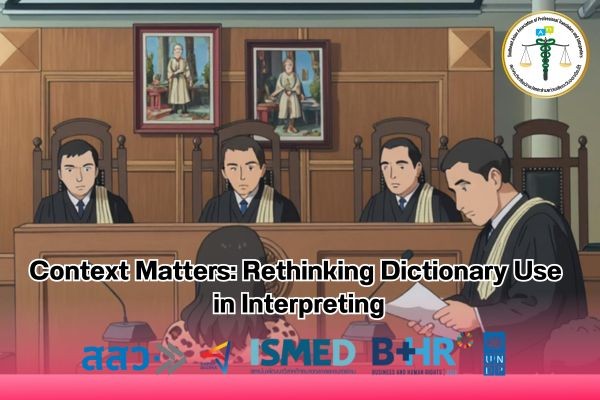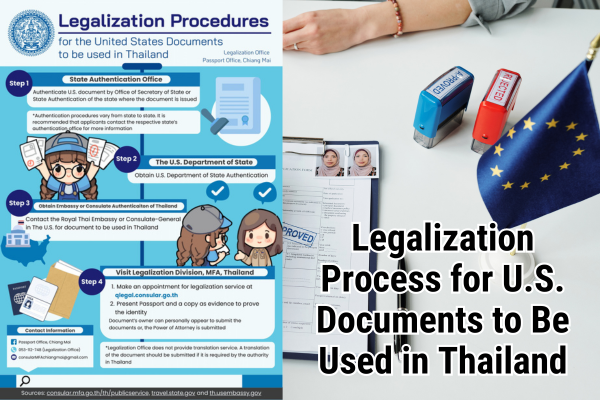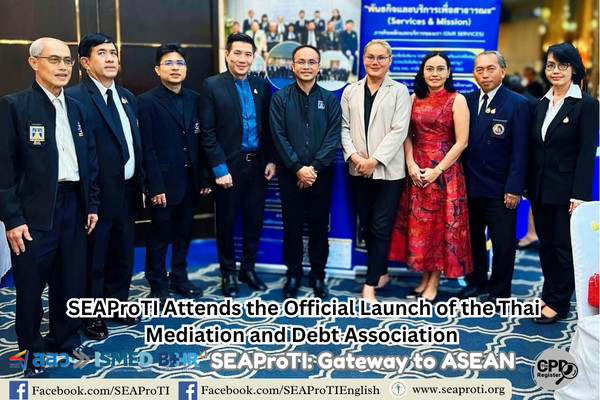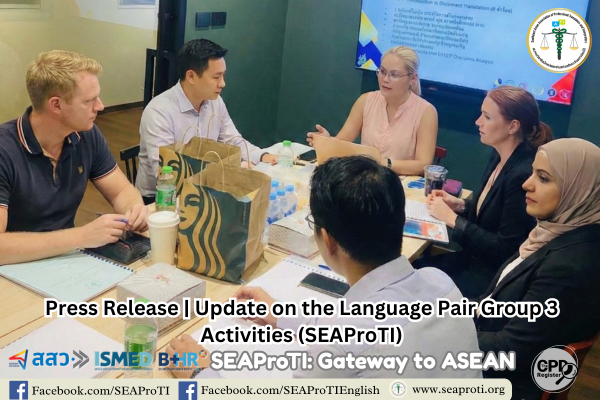Mechanical Dictionary Use and Its Impact on Interpreting Quality: A Linguistic and Professional Analysis
1. Problems with Mechanical Dictionary Use
Uncritical dictionary use refers to the practice of choosing word meanings in the order they are listed, without accounting for linguistic, social, or legal context (Gile, 2009). Common issues include:
- Domain Mismatch – Selecting a meaning unsuitable for the specific field, e.g., rendering consideration as “thoughtfulness” instead of its legal meaning, “something of value exchanged in a contract” (Mattila, 2013).
- Neglect of Pragmatic Meaning – Overlooking the speaker’s intent, such as irony, politeness strategies, or performative utterances, which require communicative rather than literal rendering (Niska, 2002).
Reliance on dictionary order can negatively affect interpreting performance in several ways:
- Shallow Understanding – Literal rendering fails to capture the speaker’s underlying intent (Berk-Seligson, 2009).
- Legal and Technical Errors – Especially problematic in court or highly specialized professional settings.
- Due Process Concerns – In legal contexts, inaccurate interpreting may infringe upon the rights of defendants or parties involved (Napier & Lee, 2020).
To avoid these pitfalls, interpreters should:
- Practice Contextual Analysis before choosing the appropriate meaning.
- Build Personal Termbases and review authentic texts such as case law, academic articles, and professional manuals.
- Engage in Paraphrasing and Back-Translation Exercises to ensure semantic equivalence.
- Use Specialized Dictionaries (e.g., legal or medical dictionaries) to ensure terminological accuracy (Mattila, 2013).
Critical and context-aware dictionary use is an essential skill for interpreters seeking to deliver accurate and nuanced renditions. This article demonstrates that selecting dictionary meanings mechanically, without considering context, results in professional shortcomings and may compromise the rights of service users. Promoting training that emphasizes analytical thinking and judicious tool use is therefore vital for advancing the interpreting profession.
References
- Berk-Seligson, S. (2009). Coerced confessions: The discourse of bilingual police interrogations. Berlin: Mouton de Gruyter.
- Gile, D. (2009). Basic concepts and models for interpreter and translator training (Rev. ed.). Amsterdam: John Benjamins.
- Hale, S. (2014). Interpreting culture: Dealing with cross-cultural issues in court interpreting. Perspectives, 22(3), 321–331.
- Mattila, H. (2013). Comparative legal linguistics: Language of law, Latin and modern lingua francas. Routledge.
- Napier, J., & Lee, J. (2020). Justice for all? Interpreting in legal settings. Bristol: Multilingual Matters.
- Niska, H. (2002). Community interpreter training: Past, present, future. Proceedings of the Nordic Symposium on Interpreting, 135–148.
* The Office of the Council of State has proposed that a Royal Decree be enacted to authorize registered translators—including those certified by professional associations or accredited language institutes—to legally certify translations (Letter to SEAProTI dated April 28, 2025)
* SEAProTI is the first professional association in Thailand and Southeast Asia to establish a system for certifying Certified Translators, Translation Certification Providers, and Certified Interpreters.
Head Office: Baan Ratchakhru Building, No. 33, Room 402, Soi Phaholyothin 5, Phaholyothin Road, Phaya Thai Subdistrict, Phaya Thai District, Bangkok 10400, Thailand
Email: hello@seaproti.com Telephone: (+66) 2-114-3128 (Office hours: Monday–Friday, 9:00 AM – 5:00 PM)
การใช้พจนานุกรมเชิงกลไกและผลกระทบต่อคุณภาพการล่าม: การวิเคราะห์เชิงภาษาศาสตร์และวิชาชีพ
พจนานุกรมเป็นเครื่องมือสำคัญในการทำงานของล่ามและนักแปล โดยเฉพาะอย่างยิ่งสำหรับล่ามมือใหม่ที่ยังอยู่ในช่วงพัฒนาคลังคำศัพท์ อย่างไรก็ตาม การใช้พจนานุกรมโดยอาศัยการเลือก “ความหมายที่ 1, 2, 3…” ตามลำดับที่ปรากฏ โดยไม่คำนึงถึงบริบท (context) มักทำให้การล่ามไม่สามารถสื่อความหมายได้อย่างลึกซึ้งและถูกต้อง (Hale, 2014) บทความนี้มุ่งวิเคราะห์ปัญหาดังกล่าว ผลกระทบต่อคุณภาพการล่าม และแนวทางปฏิบัติที่เหมาะสมเพื่อยกระดับมาตรฐานวิชาชีพ
1. ปัญหาของการใช้พจนานุกรมแบบเชิงกลไก
- การใช้พจนานุกรมอย่างไม่วิพากษ์ (uncritical dictionary use) หมายถึง การเลือกความหมายตามลำดับที่ปรากฏโดยไม่คำนึงถึงบริบททางวัจนภาษา สังคม และกฎหมาย (Gile, 2009) ปัญหาที่มักเกิดขึ้น ได้แก่ การเลือกคำแปลที่ไม่เหมาะสมกับสาขา เช่น คำว่า consideration แปลว่า “การพิจารณา” แทนที่จะเป็น “สิ่งตอบแทนตามสัญญา” ในทางกฎหมาย (Mattila, 2013)
- การละเลยความหมายเชิงปฏิบัติการ (pragmatic meaning) เช่น คำพูดเชิงประชด ประโยคคำสั่ง หรือถ้อยคำสุภาพ ที่ต้องการการแปลเชิงสื่อสาร ไม่ใช่เชิงตัวอักษร (Niska, 2002)
2. ผลกระทบต่อคุณภาพการล่าม
การพึ่งพาพจนานุกรมแบบเรียงลำดับทำให้การล่ามเกิดปัญหาหลายประการ:
- ความเข้าใจตื้นเขิน – การแปลตรงตัวทำให้ขาดเจตนารมณ์ของผู้พูด (Berk-Seligson, 2009)
- ความคลาดเคลื่อนทางกฎหมายและเทคนิค – โดยเฉพาะในศาลหรือการประชุมที่มีเนื้อหาวิชาการเฉพาะทาง
- ผลกระทบต่อสิทธิของคู่ความ – การล่ามผิดพลาดอาจทำให้สิทธิในกระบวนการยุติธรรมของผู้มีส่วนได้เสียเสียหาย (Napier & Lee, 2020)
3. แนวทางแก้ไขและการพัฒนาทักษะ
เพื่อหลีกเลี่ยงปัญหาดังกล่าว ล่ามควร
- ฝึกวิเคราะห์บริบท (contextual analysis) ก่อนตัดสินใจเลือกความหมาย
- สร้างฐานคำศัพท์ส่วนบุคคล (termbase) และทบทวนจากเอกสารต้นฉบับจริง เช่น คำพิพากษา บทความวิชาการ หรือคู่มือวิชาชีพ
- ฝึก paraphrasing และ back-translation เพื่อให้แน่ใจว่าความหมายที่ถ่ายทอดสอดคล้องกับต้นฉบับ
- ใช้พจนานุกรมเฉพาะสาขา เช่น พจนานุกรมกฎหมาย พจนานุกรมการแพทย์ เพื่อความแม่นยำ (Mattila, 2013)
บทสรุป
การใช้พจนานุกรมอย่างมีวิจารณญาณเป็นทักษะสำคัญที่ช่วยให้ล่ามสามารถถ่ายทอดสารได้อย่างถูกต้องและลึกซึ้ง บทความนี้แสดงให้เห็นว่าการเลือกใช้ความหมายตามลำดับโดยไม่พิจารณาบริบทส่งผลให้เกิดปัญหาทางวิชาชีพและอาจกระทบสิทธิของผู้ใช้บริการ การส่งเสริมการฝึกอบรมที่เน้นการคิดเชิงวิเคราะห์และการใช้เครื่องมืออย่างเหมาะสมจึงเป็นสิ่งจำเป็นสำหรับการพัฒนาวิชาชีพล่าม
เอกสารอ้างอิง (References)
- Berk-Seligson, S. (2009). Coerced confessions: The discourse of bilingual police interrogations. Berlin: Mouton de Gruyter.
- Gile, D. (2009). Basic concepts and models for interpreter and translator training (Rev. ed.). Amsterdam: John Benjamins.
- Hale, S. (2014). Interpreting culture: Dealing with cross-cultural issues in court interpreting. Perspectives, 22(3), 321–331.
- Mattila, H. (2013). Comparative legal linguistics: Language of law, Latin and modern lingua francas. Routledge.
- Napier, J., & Lee, J. (2020). Justice for all? Interpreting in legal settings. Bristol: Multilingual Matters.
- Niska, H. (2002). Community interpreter training: Past, present, future. Proceedings of the Nordic Symposium on Interpreting, 135–148.
เกี่ยวกับนักแปลรับรอง ผู้รับรองการแปล และล่ามรับรองของสมาคมวิชาชีพนักแปลและล่ามแห่งเอเชียตะวันออกเฉียงใต้
* สมาคมวิชาชีพนักแปลและล่ามแห่งเอเชียตะวันออกเฉียงใต้ (SEAProTI) ได้ประกาศหลักเกณฑ์และคุณสมบัติผู้ที่ขึ้นทะเบียนเป็น “นักแปลรับรอง (Certified Translators) และผู้รับรองการแปล (Translation Certification Providers) และล่ามรับรอง (Certified Interpreters)” ของสมาคม หมวดที่ 9 และหมวดที่ 10 ในราชกิจจานุเบกษา ของสำนักเลขาธิการคณะรัฐมนตรี ในสำนักนายกรัฐมนตรี แห่งราชอาณาจักรไทย ลงวันที่ 25 ก.ค. 2567 เล่มที่ 141 ตอนที่ 66 ง หน้า 100 อ่านฉบับเต็มได้ที่: นักแปลรับรอง ผู้รับรองการแปล และล่ามรับรอง
** สำนักคณะกรรมการกฤษฎีกาเสนอให้ตราเป็นพระราชกฤษฎีกา โดยกำหนดให้นักแปลที่ขึ้นทะเบียน รวมถึงผู้รับรองการแปลจากสมาคมวิชาชีพหรือสถาบันสอนภาษาที่มีการอบรมและขึ้นทะเบียน สามารถรับรองคำแปลได้ (จดหมายถึงสมาคม SEAProTI ลงวันที่ 28 เม.ย. 2568)
*** สมาคมวิชาชีพนักแปลและล่ามแห่งเอเชียตะวันออกเฉียงใต้ เป็นสมาคมวิชาชีพแห่งแรกในประเทศไทยและภูมิภาคเอเชียตะวันออกเฉียงใต้ที่มีระบบรับรองนักแปลรับรอง ผู้รับรองการแปล และล่ามรับรอง
สำนักงานใหญ่: อาคารบ้านราชครู เลขที่ 33 ห้อง 402 ซอยพหลโยธิน 5 ถนนพหลโยธิน แขวงพญาไท เขตพญาไท กรุงเทพมหานคร 10400 ประเทศไทย
อีเมล: hello@seaproti.com โทรศัพท์: (+66) 2-114-3128 (เวลาทำการ: วันจันทร์–วันศุกร์ เวลา 09.00–17.00 น.)

























